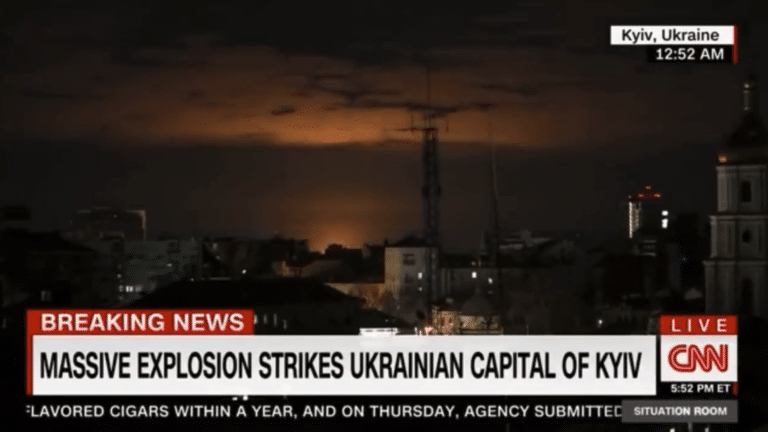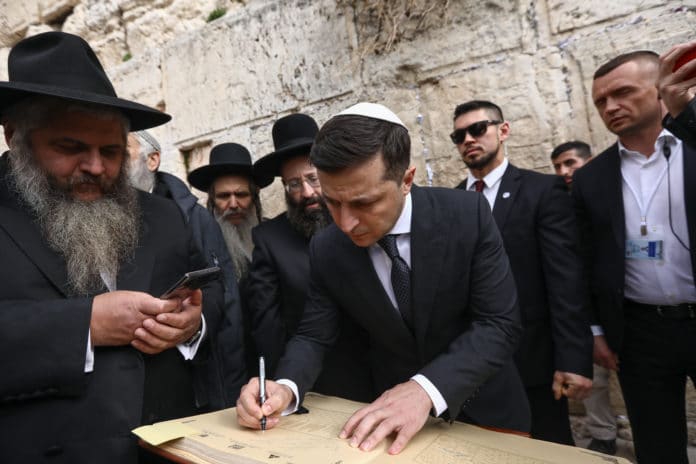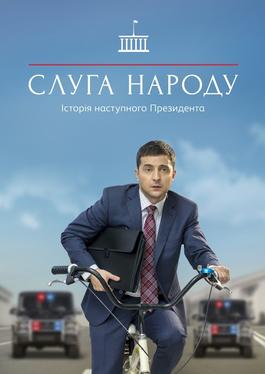
From the very start the Ukraine crisis has felt like a very Jewish story to me.
From 2014 when Russian President Vladimir V. Putin invoked Nazis and antisemitism as a reason for why he was “so concerned” with the country.
Putin here is invoking "fighting antisemitism" in Ukraine as a reason for the hostilities. pic.twitter.com/bXFL9TVGgV
— Johnny Kunza (@johnkunza) February 4, 2022
To the election of Ukrainian President Volodymyr Zelensky in 2019, a Jewish man who spoke openly about his family’s Jewish and Holocaust survival roots.
To last week when Putin invoked a “denazification” campaign for the justification of his invasion.
To today, with Jewish communities huddled in basements and bomb shelters across Ukraine trying to escape the carnage, while others are choosing to stay and defend a country which has admittedly a very complicated past when it comes to how the treatment of Jewish communities.
Hasids fighting for Ukraine. https://t.co/9zxoxkDEzz
— Johnny Kunza (@johnkunza) February 27, 2022
Ukraine has been and continues to be a very (complicated) Jewish news story.
Denazifying a Jewish president
“For this we will strive for the demilitarization and denazification of Ukraine,” Putin said in his announcement of the invasion on live TV.
The Israeli newspaper Haaretz may have had the best reaction to Putin’s gaslighting of the world.
Just to be clear, you're going to "deNazify" a country with a Jewish leader?
— Haaretz.com (@haaretzcom) February 24, 2022
By invading it?
Can someone please call irony and make sure she's okay?https://t.co/RH2W5fUSM0
Snark aside, there is something inherently evil about Putin’s claims– focusing his “denazification effort” on the only Jewish head of state outside of Israel. To make a Jewish president the primary target of a war based on fighting Nazis is beyond logic.
In fact the claim that Russia is liberating Ukraine from Nazi leadership is so absurd news anchors are calling out the lie in realtime on live television.
Live on Al Jazeera right now, a Russian ambassador repeats at length that they are fighting "Nazi ideology" in Ukraine. Al Jazeera presenter pushes back strongly "with all due respect nobody believes that sir." pic.twitter.com/tYltuGPQST
— Johnny Kunza (@johnkunza) February 24, 2022
We can scoff at this, scream hubris and all the like, but there are very real geopolitical positions at stake here that extend beyond the borders of Ukraine and Russia. Take this tweet by the Russian Foreign Ministry for example, saying that they’ve summoned the Israeli ambassador over their concerns that the only Jewish state in the world isn’t taking the Russian government’s crackdown on “Nazis” serious enough.
🇷🇺🇮🇱 25 февраля замглавы @MID_RF М.Л.#Богданов принял Посла Израиля в Москве @AlexanderBenZvi.
— MFA Russia 🇷🇺 (@mfa_russia) February 25, 2022
С российской стороны внимание уделено необходимости продолжения усилий по противодействию попыткам героизации нацизма.
🔗https://t.co/e7r0dvIatU#РоссияИзраиль pic.twitter.com/oyiN5VaX57
“On the Russian side, attention was paid to the need to continue efforts to counteract attempts to glorify Nazism,” the tweet read.
Israel, the country that went to the far corners of the earth to seek out justice for real Nazis, needs a lesson from the Russian government on how not to glorify Nazis?
“The leader of Ukraine is not a Nazi, he’s a democratically elected leader,” Michael McFaul, a former U.S. ambassador to Russia, told MSNBC’s Morning Joe while fighting back his emotions. “He’s Jewish. He is not a Nazi. I’m sorry I’m so emotional. But we’ve got to get over the fact that we’re going to deal with this guy on some realpolitik, cost-benefit analysis.”
Zelensky himself sounded confused by the logic Putin was trying to force.
“How can I be a Nazi? Explain it to my grandfather, who went through the entire war in the infantry of the Soviet army, and died a colonel in an independent Ukraine,” he said in a televised response.
Zelensky’s grandfather was the only survivor of four brothers during the Holocaust.
“Putin’s claim about ‘denazification’ is not only baseless and wrong, but also cruel and grotesque,” wrote Timothy Synder in the Boston Globe. “It is hard to think of something darker than invading a democracy with a Jewish leader in the name of fighting Nazis.”
Then there’s the efforts to make peace, Zelensky eager for some sort of diplomatic victory is trying to use Israel as a way to jumpstart talks.
“We are at one hour before midnight; it’s important to find the optimal points for dialogue,” Israeli Prime Minister Naftali Bennett reportedly told Putin in a telephone call on Sunday on behalf of his Ukrainian counterpart.
Explaining why Israel, the Ukrainian government said in a statement that they believe “Israel is the only democratic state in the world that has great relations with both Ukraine and Russia.”
This sentiment is being echoed on the ground in Ukraine. An Israeli news crew had their report interrupted by a Ukrainian fighter, he summed up his feelings for Israel saying: “Oh Israeli? Israel supports us.”
Man interrupts Israeli newscast in Ukraine, becomes legend pic.twitter.com/KUlHakmdew
— Yair Rosenberg (@Yair_Rosenberg) February 27, 2022
It’s still too early to see how this game of diplomatic chess is going to play out. As the New York Times put it: “Israel also wants to avoid taking any action that might stir antisemitism against the hundreds of thousands of Jews in both Ukraine and Russia.”

On the religious side, Zelensky is the first to admit that his ties to Judaism were weakened because of his upbringing in the USSR.
“[I grew up in an] ordinary Soviet Jewish family,” he told the Washington Post in an Interview. Zelensky explained that it wasn’t a very religious home because “religion didn’t exist in the Soviet state as such.”
That didn’t stop him however from reaching out to the Chief Rabbi of Ukraine for prayers for each Ukrainian to be safe.
Comedian turned Jewish hero

Zelensky may have shot to fame playing a fictional president in a comedy series but his leadership since the invasion has shot him up to levels of global hero.
It’s hard not to feel a collective sense of pride in how he, the grandson of a Holocaust survivor, is facing off against a world power that has historically been the downfall of the Jewish people.
Tributes to him are pouring out across the world and in Jewish circles (across the religious and political spectrum). Zalensky has turned himself into a modern day David vs. Goliath for both Jews and non-Jews alike.
As a Ukrainian-Jewish man, I’m getting a little concerned that Zelensky is setting some unachievable standards of behavior
— Sam Biederman (@Biedersam) February 26, 2022
I know this is a minor point: but a Jewish President of a sovereign Ukraine, leading their defence against a Russian enemy that smeared him as a Nazi, is so profoundly moving for so many reasons. Strength and courage to you and your people @ZelenskyyUa https://t.co/QzV9IDLKzB
— Dave Rich (@daverich1) February 25, 2022
As a Jew, it is impossible not to feel proud of the courage, dignity, and defiance shown by Zelensky at this moment.
— Molly Crabapple🇵🇷 (@mollycrabapple) February 26, 2022
Here's a Jewish president fighting a "denazification war" brought on by the Russians. Last night Zelensky told EU leaders on a video call: "This may be the last time you will see me alive." Looks like he meant it. #WARINUKRAINE pic.twitter.com/HBgVyHD0UJ
— Johnny Kunza (@johnkunza) February 25, 2022
14/24 Ukrainian leadership so far has been impressive. The President has provided a central, unifying presence for his people. He appears tired but functioning well, and he is maintaining a dialog with his people and the outside world. pic.twitter.com/pvm3VGPKgV
— Major General (just retired!) Mick Ryan (@WarintheFuture) February 26, 2022
Jewish communities once again in danger
Jews are evacuating their homes and synagogues to escape an army that says it has come to "de-Nazify" a country. https://t.co/rkQB14x6zi
— Michael Weiss 🌻 (@michaeldweiss) February 25, 2022
This story however is bigger than just one person. The invasion of Ukraine has created a refugee crisis unlike any other in modern European history and there is a uniquely Jewish angle to this too.
Evacuation of a Jewish community in Ukraine halted after they came under fire. https://t.co/LhIq4yDY6F
— Johnny Kunza (@johnkunza) February 25, 2022
Once again entire Jewish communities are uprooted, back on the road fleeing danger, perhaps to never return.
My driver Kola was overwhelmed as he saw us making Kiddush for the community during a stop. This is the video. pic.twitter.com/zHaIihdd1S
— Refael Kruskal (@Refaelkruskal) February 26, 2022
This is not hyperbole.
The Jewish Agency will open 6 Aliyah processing stations along the Ukrainian border in Poland, Moldova, Romania & Hungary to immediately assist the expected waves of immigration due to the war in Ukraine. First group of olim crossed into Poland today with the help of our Shlichim pic.twitter.com/qdOtq7pHAu
— jewishagency (@JewishAgency) February 27, 2022
The Jewish Agency has set up centers across from Ukraine’s western borders to process the influx of Jewish refugees. A large number of people are expected to make Aliyah and abandon Ukraine forever.
Russian bombing in Uman, 1 km away from the tomb of Rabbi Nachman. https://t.co/139hwMEL9B
— Johnny Kunza (@johnkunza) February 24, 2022
Uman, the spiritual birthplace of the Hasidic movement and home to the grave of Rabbi Nachman of Breslov, had to be evacuated after Russian shells fell less than a kilometer away from his gravesite. It’s hard to imagine that a place dedicated to so much joy seeing civilian fatalities due to a shelling bombardment.
Uman, the home of the grave of Rebbe Nachman of Breslov, has been evacuated. Four people were reportedly killed in Russian bombardments. Video: Hatzalah of Ukraine pic.twitter.com/ns9JKUen4V
— Johnny Kunza (@johnkunza) February 25, 2022
“We just evacuated the whole community and all the children, and we had to violate the Shabbat,” the director of Odessa’s main synagogue said in a video posted on Facebook. “We ask everyone pray that we succeed to help all the Jews we’re responsible for and that we have, God willing, a good Shabbos and great protection from Hashem.”
What’s is Shabbat going to look like in Ukraine? I’ve been in contact with several orgs and they’re going to work around the clock evacuating people— Orthodox orgs and workers too. “We are in a pikuach nefesh situation,” one person told me (preservation of life).
— Johnny Kunza (@johnkunza) February 25, 2022
Other communities aren’t as lucky and are staying put. In Kyiv, which is surrounded by Russian forces, the Jewish community is huddled in basements and other shelters, waiting out the conflict.
Children sleeping in the basement of a Chabad school in Kyiv https://t.co/uKtqkYlcEL
— Lahav Harkov (@LahavHarkov) February 26, 2022
There is something powerful in this. The fact that in 2022 Jewish communities are having to flee in the middle of the night from danger and an unknown future at the hands of a brutal invader seems surreal. But we must remind ourselves that this is a blast from our not-so-distant past. We are less than 100 years away from the Soviet show trials across Eastern Europe that saw many Jews (and non-Jews) executed for their political beliefs.
And here we are today seeing a nation on the move with their only crime being one of living in a democracy that’s at odds with a dictatorship.
“Our urgent need now is for a serious armed security company. We are afraid of looting and riots that may arise on the Ukrainian side. We saw that in 2014,” Kyiv Rabbi Jonathan Markovitch told The Times of Israel, referring to the revolution that year that ousted the pro-Russian president, Viktor Yanukovych.
This fear is well grounded. In 2014, pro-Putin militias in control of Ukraine’s breakaway regions demanded Jewish citizens register with the government. The local government reportedly handed out leaflets ordering the Jewish community to provide a list of property they own and to pay a registration fee “or else have their citizenship revoked, face deportation and see their assets confiscated.”
A very Jewish response
At times of crisis the Jewish community unites and this came out in spades after the Russian invasion.
My fiance worked the phone after Shabbat, reaching out to her contacts to assist someone stuck in Ukraine needing to get out. Her work was multiplied by the tens-of-thousands of people across the world trying to not only help the Jewish community but all Ukranians stuck in the crosshairs of Putin. Since the invasion my WhatsApp groups have been filled with prayers and actionable items on how to assist the people of Ukraine.
.@UnitedHatzalah of Israel rescue delegation has landed in Romania, passed the border with Moldova & is now on its way to Ukraine. The team has advanced life-saving equipment for those in need.
— StopAntisemitism.org (@StopAntisemites) February 27, 2022
Proud of the Jewish nation to always be amongst the first to help all those in need! pic.twitter.com/Fn9iw83s4K
Meanwhile, several Jewish organizations, along with the Israeli government, are on the ground coordinating efforts. I’m sure they would appreciate your help and support:
- The Jewish Agency is working to assist refugees to get to Moldova and has opened a hotline for assistance.
- HIAS is working with NGOs in place in Ukraine to provide assistance to refugees.
- United Hatzalah is coordinating with its Ukraine chapter to get people out of areas where there is fighting and to provide medical assistance to those who are injured.
- JDC is on the ground in Ukraine providing meals to the elderly and children.
Originally Published Feb 28, 2022 12:02AM EST
